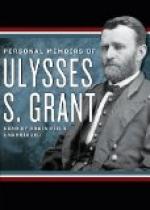Mr. Lincoln was at City Point at the time, and had been for some days. I would have let him know what I contemplated doing, only while I felt a strong conviction that the move was going to be successful, yet it might not prove so; and then I would have only added another to the many disappointments he had been suffering for the past three years. But when we started out he saw that we were moving for a purpose, and bidding us Godspeed, remained there to hear the result.
The next morning after the capture of Petersburg, I telegraphed Mr. Lincoln asking him to ride out there and see me, while I would await his arrival. I had started all the troops out early in the morning, so that after the National army left Petersburg there was not a soul to be seen, not even an animal in the streets. There was absolutely no one there, except my staff officers and, possibly, a small escort of cavalry. We had selected the piazza of a deserted house, and occupied it until the President arrived.
About the first thing that Mr. Lincoln said to me, after warm congratulations for the victory, and thanks both to myself and to the army which had accomplished it, was: “Do you know, general, that I have had a sort of a sneaking idea for some days that you intended to do something like this.” Our movements having been successful up to this point, I no longer had any object in concealing from the President all my movements, and the objects I had in view. He remained for some days near City Point, and I communicated with him frequently and fully by telegraph.
Mr. Lincoln knew that it had been arranged for Sherman to join me at a fixed time, to co-operate in the destruction of Lee’s army. I told him that I had been very anxious to have the Eastern armies vanquish their old enemy who had so long resisted all their repeated and gallant attempts to subdue them or drive them from their capital. The Western armies had been in the main successful until they had conquered all the territory from the Mississippi River to the State of North Carolina, and were now almost ready to knock at the back door of Richmond, asking admittance. I said to him that if the Western armies should be even upon the field, operating against Richmond and Lee, the credit would be given to them for the capture, by politicians and non-combatants from the section of country which those troops hailed from. It might lead to disagreeable bickerings between members of Congress of the East and those of the West in some of their debates. Western members might be throwing it up to the members of the East that in the suppression of the rebellion they were not able to capture an army, or to accomplish much in the way of contributing toward that end, but had to wait until the Western armies had conquered all the territory south and west of them, and then come on to help them capture the only army they had been engaged with.
Mr. Lincoln said he saw that now, but had never thought of it before, because his anxiety was so great that he did not care where the aid came from so the work was done.




